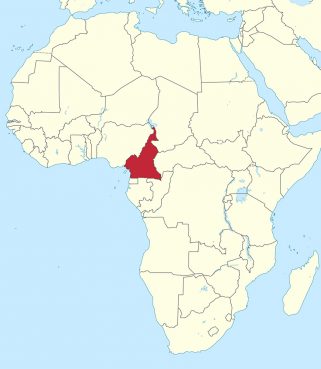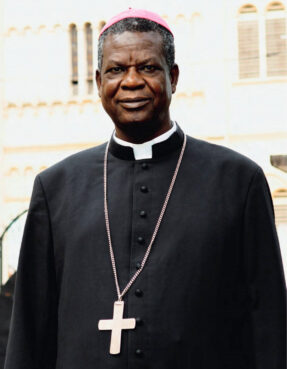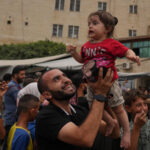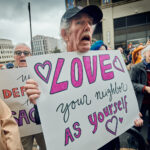DOUALA, Cameroon (RNS) — Cameroon’s presidential campaign kicked off Sept. 27, but 92-year-old incumbent President Paul Biya, seeking reelection to extend 43 years in power, was nowhere to be found. Rumored to be in Geneva, Switzerland, Biya was a no-show on Sept. 25 at the United Nations General Assembly in New York City, where he was scheduled to speak.
“He left the country just as the campaign was about to start. Very simply, he is showing disdain for his people,” Archbishop Samuel Kleda of Douala, the country’s largest city and Central Africa’s biggest port, told RNS. “If you want to be reelected, is this the way you behave? I don’t think so.”
The president returned to the capital city, Yaoundé, on Oct. 1 but has hardly engaged with the public in months.
In the absence of public leadership, Kleda and Cameroon’s 36 Catholic bishops (both Francophone and Anglophone) have emerged as Biya’s most vocal critics. Through pastoral letters, Sunday homilies and the church’s moral authority, they’ve emerged as eloquent, critical analysts, even as they resist an overtly political role. The Catholic Church, which became deeply embedded in the region during colonial rule, runs many of the schools, hospitals and social services and remains one of few trusted institutions in the country. Kleda has been sought for help by people, for advice by politicians and consulted by foreign diplomats.
Last spring, the bishops conference released a description of its ideal presidential candidate, one accessible and engaged with the public — sensitive to widespread suffering, impatient with thieves, humble and modest.
Kleda mused, “We went so far as to profile the president we need, but it hasn’t been respected.”
Cameroon, a former German colony divided between French and British control after World War I, gained independence in 1960 and reunified a year later, with the British-controlled southern portion joining the French-speaking majority.
Biya, only the second ruler in Cameroon’s relatively short history, took office in 1982, long before most Cameroonians were even born — over 60% of the country’s 30 million population is under age 25. If he wins, he will be almost 100 years old by the end of a seven-year term. Biya’s long rule has been marked by increasing authoritarianism, allegations of election fraud, corruption and an ongoing separatist conflict in the country’s two Anglophone provinces.
Cameroon’s bishops are united in describing national living conditions as unacceptable. At the conclusion of its annual meeting in January, the bishops conference issued a communiqué describing the socioeconomic situation of Cameroon.
Sensitive to the “cries of despair at the misery Cameroonians are living through,” the bishops challenged the political class to end its “organized plundering of our economic heritage,” and chronic habit of embezzling public funds.

Cameroon, red, in western Africa. (Map courtesy of Wikimedia/Creative Common)
Opposition to Biya is disorganized. Some 12 candidates were approved by the electoral commission, including two former government ministers. So far, they’ve failed to forge consensus around one opponent; none seem strong enough to win a simple majority vote.
“It’s as though, there’s no one else who can run the country except him, which is not true. We have many accomplished people who could do this job!” observed Marcellus Nkafu, manager of a bookstore facing Douala’s massive Cathedral of Saints Peter and Paul.
Journalist Augustin Wendung of Radio Veritas TV explained, “There’s serious skepticism among the electorate. It’s not a democratic process because the candidates do not have a level playing field. Some are fabricated, satellite political parties, playing games for the regime. It’s not transparent. We hear a lot of frustration.”
“Cameroon is a powder keg,” summarizes Nkem Khumbah, Cameroon-born director of science, technology and innovation at the African Academy of Sciences.
TikTok is full of local content mocking Biya. Among the most popular posts are those showing him in public settings seeming to forget what he’s doing. Laugh tracks dominate commentary.
Even the president’s daughter, Brenda Biya, 28, urged followers in a plaintive TikTok post from Switzerland not to re-elect him: “Please do not vote for Paul Biya,” she implored, sporting pink hair and a prominent septum ring. “He has made too many people suffer. I hope we get a new president.” She deleted the viral video later, but it continues circulating widely.
Meanwhile, a bloody separatist movement in two provinces threatens national unity. The so-called Anglophone crisis emerged eight years ago when teachers and lawyers took to the streets, protesting cultural abuses by the central government such as sending French teachers into English-speaking schools and judges into courts that follow British commonwealth procedure (a legacy of colonial rule). Soldiers shot demonstrators, quickly radicalizing local people. Archbishop Kleda urged the government to engage in direct talks with insurgents.

FILE – Archbishop Samuel Kleda of Douala. (Photo by Victor Zebaze/Wikimedia/Creative Commons)
The bishop’s recent statement even expressed suspicion regarding the government’s motives for avoiding negotiation with the two insurgent provinces: “Could it be that those who wage the war are getting scandalously rich and do not want the war drawn to an end?”
In a Sunday homily on Sept. 28 at St. Marc’s parish on the outskirts of Douala, Archbishop Kleda preached about Lazarus, the poor man carried to heaven while the unnamed rich man, who ignored Lazarus in life, begged from hell for a drop of water from Lazarus’ finger (Luke 16:19-31).
“The rich don’t care for the poor or the sick. That’s the situation we live in today. Riches make them blind to reality,” intoned the towering bishop, over 6-feet 5-inches tall. “The prophet makes us aware of the gravity of suffering.”
Attending Kleda’s Mass were more than 1,000 parishioners — more people than at most weekend electoral rallies — flowing out multiple doors and packing an upstairs balcony. Since Kleda took charge in 2009, the Catholic population of Douala has doubled; he has built 46 new parishes for a total of 88 in his archdiocese.
In August, Kleda released a pointed critique of current conditions in Cameroon in a prophetic pastoral letter, addressed to citizens poised to vote.
In his published letters, the archbishop explained popular discontent as flowing from decadeslong massive public mismanagement of the country’s wealth; a self-serving political class enriching itself despite “atrocious suffering”; a tainted democracy using “institutional violence” against opponents; and “the brutality of the army, which razes entire villages” suspected of aiding enemies in the two Anglophone provinces and in the country’s north, where Boko Harem is active.
Kleda pointed to the inexplicable lack of basics such as safe drinking water, paved roads, electricity or employment for the young and for professionals, who are leaving the country in a surging brain drain. Meanwhile, more than 400,000 refugees from regional conflicts have fled to Cameroon, where they remain impoverished.
He reserved special abhorrence for corruption around Cameroon’s natural resources, describing the unrealized benefits of oil revenue as “a complete mystery, because the hydrocarbon sector is controlled by a group of individuals who award themselves exploration and drilling contracts, oil contracts, and marketing rights.”
“The government did not say it wasn’t true, because it’s based on facts!” the archbishop exclaimed to RNS. “They ask, ‘Why do you get involved?’ and I say, ‘I speak as a Cameroon citizen.’”
In fact, Kleda sees his role as representing all: “The priest or bishop is at the service of everyone regardless of one’s religious affiliation or non-affiliation,” he explained to me in his office. “I am at the service of the people who need me, like Jesus Christ who stays in the middle of the people he serves. It is true that I’m a Catholic, but I am here for everybody.”
As former president of the National Episcopal Conference of Cameroon, Kleda traveled extensively in the successionist provinces known as NOSO, a French acronym for Northwest and Southwest also known as Ambazonia, where some 4 million people live. Rich in resources, including oil, it has become extremely poor since the conflict began.
“They want Cameroon to become a federal republic. That’s not separation. The government should recognize their autonomy,” the bishop told RNS. Kleda also traveled to Nigeria to meet Cameroonian refugees, urging them to return home. Many did.
But government officials have come to see Kleda, obviously aware of the Church’s messages.
“If they begin to serve the people, perhaps we can establish constructive dialogue,” Kleda said hopefully.
Ashley White, director of the U.S. embassy’s Douala branch, told RNS the Catholic Church “is one of the only neutral actors in Cameroon.”
Years ago, White’s colleagues in Buenos Aires referred to then-archbishop Jorge Bergoglio, future Pope Francis, as “a leader of the opposition,” as revealed by Wikileaks. It’s a role bold Catholic leaders are willing to play.



